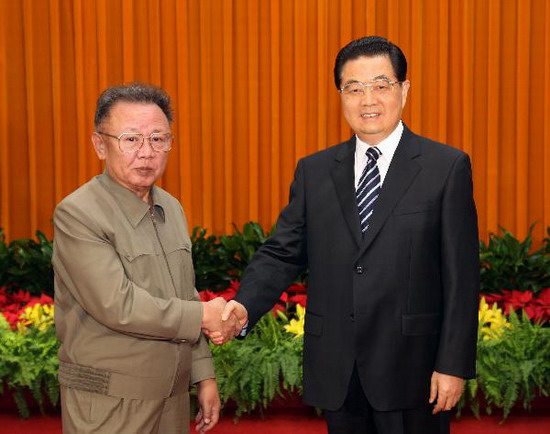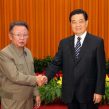
Kim Jong-Il’s Secret Visit to Beijing
Publication: China Brief Volume: 10 Issue: 10

North Korean President Kim Jong-Il’s recently completed visit to Beijing, which came on the heels of South Korean President Lee Myun-bak’s trip to attend the 2010 Shanghai Expo, has testified to China’s unprecedented clout over strategic developments in the Korean Peninsula. Yet despite Dear Leader Kim’s positive signals over re-opening the Six-Party Talks on denuclearization, it has become increasingly unlikely that the Chinese Communist Party (CCP) administration will do much to oblige Pyongyang to dismantle its nuclear arsenal. Instead, the leadership under President Hu Jintao is banking on fast-growing economic links with the DPRK—and Kim’s reliance on Beijing’s blessings for the continuation of the Kim Dynasty—to ensure that China’s interests will not be hurt by North Korea’s accession to the Nuclear Club. Beijing’s apparent softened line toward Pyongyang, however, could antagonize both South Korea and Washington, which are counting on China to crack the whip on a regime that has displayed more signs of roguishness in the past few months.
While the global media’s interest in the Kim visit is focused on the nuclear issue, this hardly had pride of place in statements released by the Chinese and North Korean authorities. After Kim’s tête-à-tête with Hu on May 5, the official Xinhua News Agency quoted the North Korean supremo as saying "the DPRK remains unchanged in sticking to denuclearization on the Korean Peninsula," adding, "Kim said the DPRK will work with China to create favorable conditions for restarting the six-party talks" (Xinhua News Agency, May 7; China News Service, May 7). Yet in Kim’s talks with Hu, Premier Wen Jiabao and other top Chinese leaders, he made no reference to any possible steps that he might take to revive the Six-Party Talks, such as temporarily halting Pyongyang’s nuclear program. Nor did Hu or Wen say anything to pressure the North Korean dictator to wind down the Stalinist regime’s efforts to manufacture weapons of mass destruction (WMD).
Beijing’s apparent acquiescence to Kim’s nuclear brinksmanship is clear if comparisons are made with the harsh rhetoric the Hu leadership used soon after the DPRK detonated a nuclear device on May 25 last year. On that occasion, the Chinese Foreign Ministry reacted angrily and said Beijing was "resolutely opposed to the DPRK again undertaking a nuclear test in disregard of the global community" (See "Beijing Mulling Tougher Tactics Against Pyongyang," China Brief, June 12, 2009). Chinese diplomats began immediate consultations with Washington on a tougher set of United Nations sanctions against the DPRK, which were passed on June 12. The sanctions included a widened ban on arms exports from the DRPK, inspection of North Korean ships in international waters, and punitive financial measures (BBC news, June 12, 2009; Guardian [London] June 12, 2009). Perhaps most significantly, state censors under the direct supervision of the CCP leadership allowed renowned Chinese scholars to, for the first time, openly criticize Beijing’s erstwhile ally. Sun Zhe, an international affairs professor at Tsinghua University, said that Beijing should punish Pyongyang for "nuclear blackmail." Pointing to the fact that most of the DRPK’s WMD facilities are located near China’s northeastern region, Central Party School Korea expert Zhang Liangui warned that any mishap would result in "China’s economically resurgent northeast (provinces) bursting like a bubble." Zhang warned that "This is an unprecedented threat that China has never faced in thousands of years" (Reuters, June 2, 2009; Globaltimes.com, June 4, 2009).
Even before Premier Wen visited the DPRK last October, however, it had become clear that the CCP leadership had decided that tough tactics would not work. Wen boosted economic and fuel aid to Pyongyang despite failing to get from Kim any concessions about de-escalating his nuclear program or reactivating the Six-Party Talks. At about the same time, Beijing effectively stopped observing DPRK-related U.N. sanctions. Last November, South African authorities seized a shipment of North Korean tank parts bound for the Republic of Congo. The cargo, which belonged to a North Korean company, had first been loaded onto a vessel in a northeastern China port (Reuters, February 23; BBC News, February 26). More significantly, the CCP leadership seems reconciled to the fact that they could not stop the DPRK from attaining its decades-long goal of developing nuclear weapons and other WMDs. As Zhou Yongsheng, an international politics specialist at China Foreign Affairs University pointed out on the eve of the Kim visit: "It would be difficult for North Korea to give up its nuclear arsenal." "When Pyongyang didn’t have the weapons, they were reluctant to abandon [efforts to develop them]," he explained. "Now that the DPRK already possesses the weapons, they would be even less willing to give them up" (Ming Pao [Hong Kong], May 5; Zaobao.com [Singapore], May 8).
Also disappointing to China’s neighbors in the Asia-Pacific region is that Pyongyang’s increasingly apparent involvement in the sinking of the South Korean warship Cheonan did not seem to have come up in Kim’s discussions with top Chinese cadres. Neither Chinese officials nor the official media said anything about asking Pyongyang to clarify its role in the naval mishap in late March. This was notwithstanding the fact that South Korean President Lee Myun-bak had met Hu on the sidelines of the opening ceremony of the Shanghai Expo on April 30 for the purpose of asking Hu to twist Pyongyang’s arms regarding the Cheonan issue. Yet all that the Chinese leader did on the occasion was to express condolences for the Cheonan’s victims (Korea Times [Seoul], May 2 and May 7; New York Times, April 28). Dissatisfaction with China’s tame stance toward Pyongyang prompted the South Korean Foreign Ministry to lodge a formal protest with Beijing about Kim’s visit. The South Korean media was more forthcoming about Seoul’s frustration with China’s DPRK policy. South Korea’s largest paper, the Chosun Ilbo, criticized Beijing for remaining mum on the Cheonan issue while showering North Korea with more economic assistance. "Aid would end up neutralizing the effects of U.N. sanctions against Pyongyang following its second nuclear test last year and make a joke out of punitive measures the international community could take if the North is responsible for the sinking," the paper editorialized (Chosun Ilbo [Seoul], May 5; Globaltimes.com, May 5).
Irrespective of the global reactions to this latest twist in China’s DPRK policy, the CCP leadership seems confident that it can enhance its leverage with Pyongyang through two potent weapons. One is helping the 68-year-old Kim ensure that his third son, Kim Jong-Un, can successfully take over power upon his demise. Secondly, Beijing hopes that North Korea’s growing dependence on Chinese economic aid and investments will translate into Kim—and his successor—fully respecting China’s geopolitical interests in the region. Noted Renmin University political scientist Jin Canrong had this to say about the Kim visit: "The transfer of power is the number one issue, money is number two, and then the security situation" (BBC News, May 5; Ming Pao, May 6). Given the sensitivity of the succession issue, it is not surprising that neither the Chinese nor the North Korean authorities touched upon this matter in public. This was despite speculation in the South Korean press that Dear Leader Kim had brought along his heir to China. It is understood, however, that since Kim fell seriously ill in 2008, the increasingly frail Dear Leader has repeatedly sought the blessings of the DPRK’s only patron for a smooth-sailing transfer of power to his 26-year-old son (Chosun Ilbo, May 5; Los Angeles Times, May 7; Chaoxian.com.cn [Beijing], May 5).
Cementing bilateral economic ties was the centerpiece of the Kim visit. President Hu suggested to his visitor that "relevant departments of the two governments should discuss and explore ways on expanding economic and trade cooperation." Premier Wen also told Kim that both countries should "make joint efforts to advance major cooperative projects, quicken the infrastructure construction in border areas and explore new cooperative fields and methods so as to benefit the two peoples." The DPRK supremo reciprocated by signaling his country’s readiness to learn from the Chinese reform experience. "China’s achievements are a great encouragement to the people of the DPRK" he said, adding that "the DPRK side welcomes Chinese enterprises to invest in the country and will actively lift the level and quality of bilateral pragmatic cooperation" (People’s Daily, May 8; Reuters, May 7).
Prior to arriving in Beijing, Kim visited Dalian in Liaoning Province and Tianjin, North China’s fast-developing business and high-tech hub. It is significant that for the first time, Kim brought along senior regional officials with experience in trade and foreign investment. The South Korean press has reported that aides traveling with Kim were unusually aggressive in talking to potential investors in Dalian and Tianjin. Chuang Li Group, a Dalian-based company, recently signed a 10-year lease for a port in the North Korean city of Rajin (Globaltimes.com, May 4; Korea Herald, March 29). The state-run corporations in Dandong on the Chinese side of the Sino-North Korean border are planning to lease two DPRK islands in the Yalu River for development into special economic zones. Earlier this year, the Chinese Foreign Ministry claimed that these enhanced economic ties, which were "normal exchanges and cooperation" between the two countries, would not constitute any violation of U.N. sanctions against the DPRK (Globaltimes.com, May 7; Voice of America, February 25).
While the CCP leadership may feel satisfied about prolonging its "lips-and-teeth" relations with the DPRK, its failure to discipline Pyongyang could render the prospect for denuclearization even bleaker. Both Seoul and Washington have indicated that the Six-Party Talks should wait until North Korea’s role in the Cheonan disaster is cleared up. When asked about the talks, Chief U.S. Negotiator Stephen Bosworth said Washington was in a "posture of waiting" to ascertain factors behind the Cheonan’s demise. "Our focus is on supporting the Republic of Korea as it tries to establish exactly what happened with the Cheonan," Bosworth said. Other experts pointed out that given Pyongyang’s don’t-give-an-inch stance on its ongoing nuclearization program—and Beijing’s redoubled backing for its client state—a re-opening of the Six-Party Talks could only result in little more rounds of mutual recrimination (AFP, May 6; Los Angeles Times, May 7). With Pyongyang having won new endorsements from its patron, there seems little that South Korea, Japan or the United States can do to prevent the increasingly determined Kim from reaching his lifelong goal of joining the Nuclear Club.





